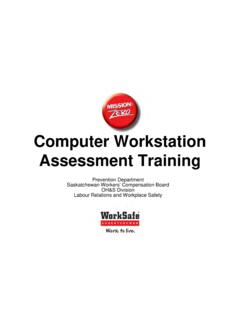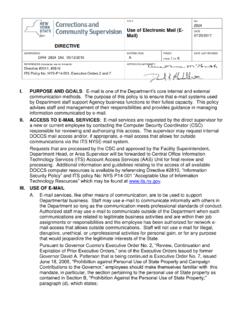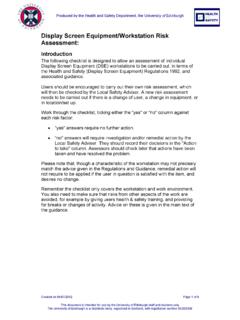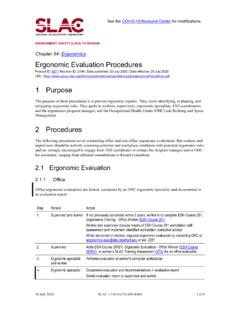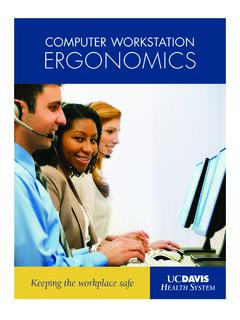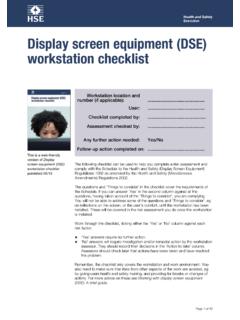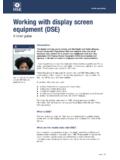Transcription of 6.6 Module 6: Computer Basics for Audio Visual Workstations
1 BA (Hons) in Audio and Music Technology 86 Module 6: Computer Basics for Audio Visual Workstations Module Title Computer Basics for Audio Visual Workstations Module NFQ Level (only if an NFQ level can be demonstrated) 6 Module number/Reference BAAMT106 Parent Programme BA (Hons) in Audio and Music Technology Stage of Parent Programme 1 Semester 2 Module Credit Units (FET/HET/ECTS) ECTS Module Credit number of Units 5 List the teaching and learning modes FT Entry requirements (statement of knowledge, skill and competence) Learner has earned Level 5 qualification. No previous experience is required Pre-requisite Module titles None Co-requisite Module titles None Is this a capstone Module ? (Yes or No) No Staff qualifications (academic, pedagogical and professional/occupational) and experience required.
2 (staff includes workplace personnel who are responsible for learners such as apprentices, trainees and learners in clinical placements) Staff are required to have at least a Bachelor of Arts (Honours) qualification in Music Technology or related discipline. Industry experience would be a benefit but is not a requirement. Staff are expected to have the Certificate in training and Education qualification from Griffith College or its equivalent. Staff/learner ratio per centre (or instance of the Module ) For lecture load, ratio of 1:50 lecturer to learner is required and in lab sessions the maximum allowed is 1:25 The lecturer will also have 1 hour per week set aside in their timetable for 1:1 contact with learners who require it or have particular items they want to discuss. Maximum number of learners per centre (or instance of the Module ) 50 Duration of the Module One Academic Semester, 12 weeks teaching Average (over the duration of the Module ) of the contact hours per week.
3 3 Physical resources and support required per centre (or instance of the Module ) One lecture hall with capacity at least 50 and one Computer lab with capacity of 25. BA (Hons) in Audio and Music Technology 87 Analysis of Required Learning Effort Effort while in contact with staff Classroom and Demonstrations Mentoring and small group tutoring Other (Specify) Directed e-learning (hours) Independent learning (hours) Other hours (specify) Work-based learning hours of learning effort Total Effort (hours) Hours Minimum ratio teacher/learner Hours Minimum ratio teacher/learner Hours Minimum ratio teacher/learner 24 1:50 12 1:25 89 125 Allocation of marks (within the Module ) Continuous assessment Supervised Project(s) Proctored practical Proctored Written Examination Total Percentage contribution 100% 100% Module Aims and Objectives A working knowledge of Computer hardware, operating systems and network solutions is essential to the modern digital multimedia practitioner.
4 This Module aims to familiarise the learner with the architecture supporting today s modern applications while promoting the problem-solving skills necessary in the efficient use and maintenance of the Computer workstation . BA (Hons) in Audio and Music Technology 88 Minimum Intended Module Learning Outcomes On successful completion of this Module the learner will be able to: MLO 6. 1 Describe digital concepts as they relate to foundational hardware and software constructs of the AV workstation . MLO Identify and efficiently utilise hardware and software components necessary to workstation commissioning. MLO Employ modern operating systems effectively to deploy software, manage, backup and integrate Cloud Services. MLO Assess the functioning of media applications, software assets and project organization.
5 MLO Integrate external hardware and software in implementing inter-application connectivity and synchronisation. Rationale for inclusion of the Module in the programme and its contribution to the overall IPLOs Managing Computer systems and troubleshooting problems is an essential skill in a modern Audio environment. Being able to solve issues outside of the standard music or Audio packages is vital to the smoother running of projects in any digital Audio environment. This Module particularly focuses on the learner s ability to achieve Programme Learning Outcome 3. This Module also serves as prior learning in achieving Outcome 8. Information Provided to Learners about the Module Learners enrolled on this Module will receive a copy of the Module descriptor and assignment briefs, including an outline of the criteria for assessment .
6 Previous examples of assignments are also presented to the class. Module Content, Organisation, and Structure The Module is organised to deliver theory through lectures (2 hours) and supervised tutorials (1 hour). During tutorials, each learner will have a workstation allowing the lecturer to work individually with learners to demonstrate and explain the material. The lectures each week will combine lecture delivery and discussion on the material. Each lecturer has a time allocated for one-to-one meetings with learners as required. These are not mandatory sessions but available either where the lecturer wishes to discuss an element of the Module with a learner, or a learner requests a meeting to discuss a particular topic. These sessions focus on academic issues only.
7 BA (Hons) in Audio and Music Technology 89 Module Content: Digital concepts relating to foundational hardware and software constructs of the AV workstation A clear comprehension of number bases, logic operators, rudimentary dc circuits and relevant common digital protocols. Hardware and software components necessary to workstation commissioning. A demonstration of a workstation installation encompassing: o Hardware configuration o Software installation and customization o Troubleshooting exercise based on tutor intervention Employing modern operating systems to deploy software, manage, backup and integrate Cloud Services A demonstrable deployment workflow of a project archive and backup strategy utilizing: o Local nearline backup o Far-line backup o Remote cloud storage Media applications, software assets and project organization A devised workflow for transferring recording projects between DAW applications and different studio environments.
8 Implementing inter-application connectivity and synchronisation A practical demonstration of integrating a host DAW with: o external devices such as network storage, WIFI controllers etc. o correctly configured slave rewire and IAC driver applications and instruments Module Teaching and Learning Strategy The Module is delivered using a combination of lectures, tutorials and practical lab Computer sessions. The emphasis is on developing practical skills based on sound theoretical knowledge. It is not enough for learners to understand the theory in a Module such as this. A lot of emphasis is put on the lab work, but also in emphasising to the learners that they need to work on the material outside the lab. Most learners will have previous experience with computers.
9 This Module will enable them to configure and troubleshoot issues for multi-media workflows. BA (Hons) in Audio and Music Technology 90 Activity Teaching / Learning Strategy Learning Environment Lectures (24 hours) Lectures / participative discussions / demonstrations of correct procedures for connecting music technology hardware and software College Tutorial (12 hours) training in and use of Computer skills / practical implementation of skills using computers and AV Workstations / problem solving exercises / analysis of music technology techniques and recording software packages College / Mac lab Assignment (48 hours) Practice learning and perfecting live music performance technology skills College / Studio Independent Work (41 hours) Directed and self-directed learning / home study / use of college live sound equipment College / Home Timetabling, Learner Effort and Credit The Module is timetabled as one 3-hour session for the whole class.
10 Generally, this will consist of a 2-hour lecture followed by a 1-hour tutorial / practical class on Workstations . The number of credits assigned to this Module is our assessment of the amount of learner effort required. It is our view that 5 ECTS of learner effort is required by learners coming new to the material to achieve the learning outcomes required. Work-based Learning and Practice-placement. There is no work based learning or practical placement involved in the Module . E-Learning The College VLE is used to disseminate notes, advice and online resources to support the learners. The learners are also given access to as a resource for reference. Module Physical Resource Requirements Requirements are for a fully equipped lecture hall and access for learners to hour sessions in a Computer lab.

